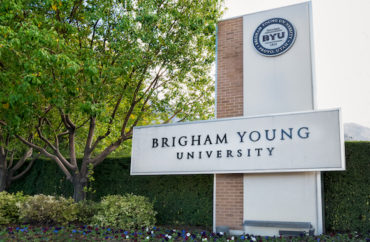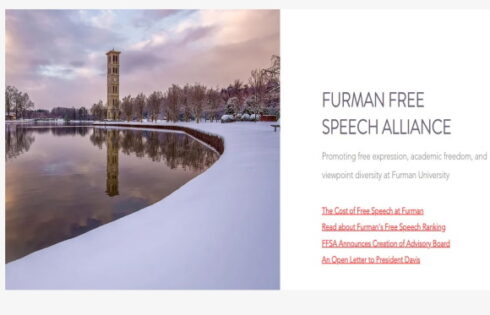
Students, alumni express confusion after BYU dropped policy three years ago
Brigham Young University reinstated a code of conduct this fall that charges students and faculty to abstain from “same-sex romantic behavior” after removing similar language three years ago.
The ban is part of the updated Church Education Honor System Code, which outlines behavioral expectations of all BYU students and employees in alignment with the teachings of the Church of Jesus Christ of Latter Day Saints, which runs the university.
“Live a chaste and virtuous life, including abstaining from sexual relations outside marriage between a man and a woman. Living a chaste and virtuous life also includes abstaining from same-sex romantic behavior,” the updated honor code states.
The standards are applied at each of BYU’s four locations: Provo and Salt Lake City, Utah; Rexburg, Idaho; and Laie, Hawaii.
The reinstitution of the ban on “same-sex romantic behavior” has sparked controversy this fall, dividing allies of BYU’s traditional religious values and dissenters intent on effecting LGBTQ equality.
“I think one of the weaknesses of the updated honor code is that it doesn’t align with several things that leaders of the church have said in the past,” BYU alumnus Tyler Mansfield told The College Fix. “The law of the church/gospel forbids sexual relationships outside of marriage, but BYU extends this teaching to all ‘romantic behavior’ but only for same-sex relationships.”
Mansfield pointed The Fix to a 2019 statement by Mormon church prophet Russell Nelson who said “homosexual immorality will be treated the same as heterosexual immorality.”
He said this impartiality also was reiterated by former BYU President Jeffrey Holland who “always reinforces that it comes back to the Law of Chastity, which he says applies equally to homosexual and heterosexual individuals.”
Despite verbally equalizing all forms of sexual immorality, “the field is not as equal as BYU claims it to be,” Mansfield noted.
He said there is a disparity between romantic acts on campus, because “holding hands between a man and a woman is revered … while the same action between a same-sex couple warrants academic discipline,” despite not being in violation of “the church’s definition of the Law of Chastity.”
Mansfield said BYU refuses “to define what ‘romantic behavior’ is, insisting on a case-by-case basis,” which makes it “difficult for LGBTQ individuals to know how to follow such a vague rule.”
“Does hanging out exclusively with another LGBTQ individual count as romantic behavior? Does hugging? Does holding hands? Does kissing?” he said.
He said the university “either needs to come forward and be fully explicit about its rules as an academic institution, or align with the church and simply enforce the Law of Chastity as it is defined doctrinally: abstinence from sexual relations outside of a legal marriage between a man and a woman and fidelity within marriage.”
The College Fix also contacted the university’s media relations manager twice in the past three weeks, but did not receive a response on why they reinstated the policy, what its impact has been on campus relations, what they believe are the benefits of the change, and what the consequences are for violating it.
The Fix also asked about its discipline policy regarding sexual behavior involving both LGBTQ and heterosexual individuals.
Published in August, the updated honor code outlines the Church of Jesus Christ of Latter Day Saints’ expectations for students, faculty and staff in its educational system, including a dress code, abstinence from alcoholic beverages, tobacco, tea, coffee, vaping, marijuana and other substance abuse, and moral principles that they are expected to abide by.
The church also published a series of frequently asked questions regarding the policy changes, including that of same-sex romantic behavior. Among other things, it addressed disciplinary measures for those in violation of the ban.
“As in years past, each situation will be handled on a case-by-case basis to help each student feel the love of the Savior and to encourage them to live their gospel covenants and university/college commitments,” the Church Educational System, which oversees the university, said in a statement.
Mormon Elder Clark Gilbert, the commissioner of education, echoed this sentiment in an Aug. 24 announcement, saying: “Our goal is that all students and employees feel the love of the Savior, experience the growth from applying gospel principles, and more fully realize the joy associated with being part of a covenant-keeping community.”
In 2020, church officials sparked controversy when they removed language barring “homosexual behavior” from the honor code at Brigham Young University.
Responding to questions at the time about the seeming contradiction between the code and church teachings about homosexuality, church officials said the “moral standards of the Church did not change” with the updated Honor Code.
Today this letter from Elder Paul V. Johnson, Commissioner of the Church Educational System, regarding the updated Honor Code was sent to students and employees at all CES schools. pic.twitter.com/sADljd8lQT
— BYU (@BYU) March 4, 2020
In a March 2020 letter to the student body, Elder Paul Johnson, commissioner of the Church Educational System, said marriage is a God-ordained union that finds appropriate expression in the joining of a man and woman.
Because “same-sex romantic behavior cannot lead to eternal marriage” or produce biological offspring, it is “not compatible” with the school’s values, Johnson wrote.
However, Johnson did not explain the reason for the removal of the language at the time.
The university’s back-and-forth on same-sex romantic behavior also has been met with criticism from students and alumni with the RaYnbow Collective, which describes its mission as “empowering and uplifting queer students at BYU through community, resources, and support.”
When asked about the policy change, the RaYnbow Collective declined to comment, but directed The College Fix to its Aug. 27 statement on Instagram.
“There is now a clear discrepancy between the treatment of same-sex romantic behavior in the church handbook and its treatment at affiliated schools,” the collective said in the statement, adding that “queer students and faculty can be disciplined for behavior that straight campus members can not.”
MORE: BYU stops offering speech adaptation services to transgender clients
IMAGE: Ken Wolter / Shutterstock
Like The College Fix on Facebook / Follow us on Twitter





Please join the conversation about our stories on Facebook, Twitter, Instagram, Reddit, MeWe, Rumble, Gab, Minds and Gettr.